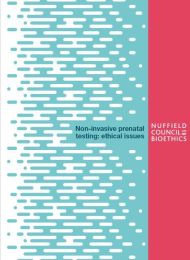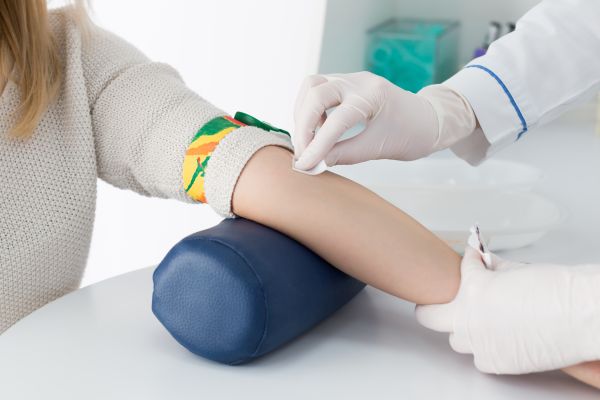Non-invasive prenatal testing: ethical issues
Report
Published 01/03/2017

A range of evidence gathering activities, including reviews of research relevant to NIPT and consultation with people with a range of professional and personal interests in NIPT, were conducted between April and December 2016 to inform the deliberations of the Working Group.
Evidence reviews
We commissioned a review of literature and evidence on the factors affecting decision making by pregnant women and couples about prenatal genetic screening and NIPT.
Written by Dr Gareth Thomas, Lecturer in Sociology School of Social Sciences Cardiff University
In-house reviews of research on the impacts of prenatal screening on disabled people; laws and regulations relevant to NIPT; and patient information provided to women and couples seeking NIPT were also carried out.
Interviews with people with genetic conditions
Interviews were conducted with people with a genetic condition or impairment to explore their experiences and personal perspectives on the issues raised by NIPT.
The Working Group collaborated with the national learning disability charity Mencap to carry out interviews with people with Down’s syndrome. Dr Barbara Barter, Clinical Psychologist, was recruited to lead the consultation exercise and carry out the interview – find out more.
Call for views and evidence
To inform our deliberations, we held an online call for views and evidence from 19 May to 1 August 2016. This included an anonymous survey for anyone with a personal or professional interest in NIPT, and a consultation document with a longer set of questions for more in depth responses.
You can read a summary of the consultations responses and can still view the survey questions and the consultation document.
Evidence gathering meetings
The Working Group met with people who have experience of and views about NIPT, including:
- People with recent personal experience of prenatal screening – conversations with women who are or have recently been pregnant and their partners.
- People with genetic conditions – conversations with people who have genetic conditions that can be detected using NIPT.
- Companies developing and offering NIPT tests – meetings with people representing companies that are developing and offering NIPT tests.
- Regulators and professional bodies – a group meeting with government and professional bodies involved in regulation and policy making relevant to NIPT took place on 6 July.
- Families of people with genetic conditions – a group meeting with family members of people with genetic conditions that NIPT can test for, such as Down’s Syndrome, and the organisations that support and campaign for them, took place on 29 June.
- Healthcare professionals – a group meeting with healthcare professionals involved in the delivery of prenatal screening and NIPT in NHS and the private sector took place on 23 June.
Background paper
The Council commissioned a background paper on NIPT to inform the discussions at a 2016 meeting to discuss potential future projects.
Written by Vardit Ravitsky, Associate Professor at the University of Montreal, Canada
The paper provides an overview of clinical, ethical, social, legal and policy issues. It is not intended to offer any conclusions or recommendations regarding future policy and practice.
Roundtable meeting
The Council convened a roundtable meeting in London in January 2016 to discuss any issues raised by recent developments in non-invasive prenatal diagnosis, testing and screening. The meeting was attended by 31 people, who included healthcare professionals, academic researchers, policy makers, representatives of charities and patient groups, and members of the Nuffield Council on Bioethics. A note of the roundtable meeting is available to download.

Share